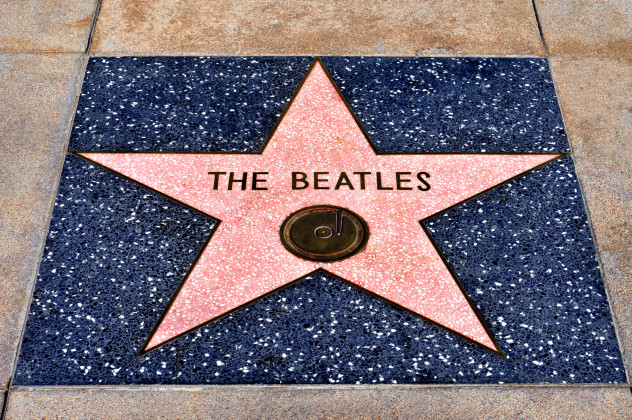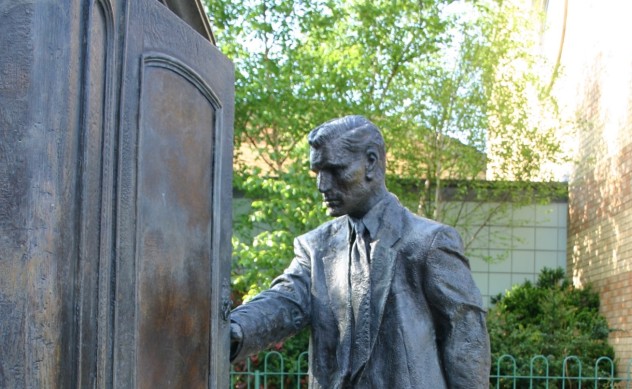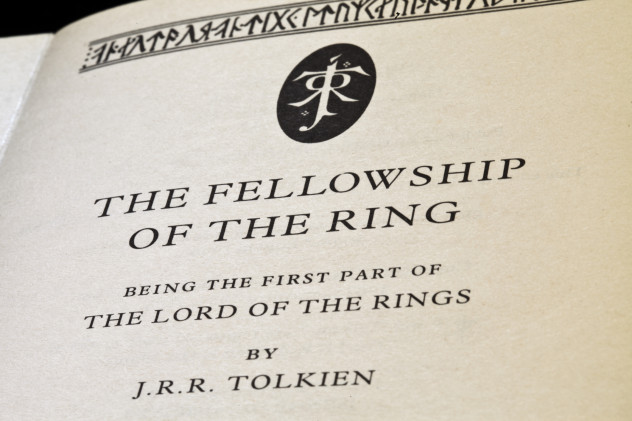 History
History  History
History  Health
Health 10 Everyday Activities That Secretly Alter Consciousness
 History
History Top 10 Historical Disasters Caused by Someone Calling in Sick
 Animals
Animals 10 New Shark Secrets That Recently Dropped
 Movies and TV
Movies and TV 10 Forgotten Realities of Early Live Television Broadcasts
 Technology
Technology 10 Stopgap Technologies That Became Industry Standards
 Weird Stuff
Weird Stuff 10 Wild Facts About Taxidermy That You Probably Didn’t Know
 Travel
Travel 10 Beautiful Travel Destinations (That Will Kill You)
 Miscellaneous
Miscellaneous 10 Modern Marriage Rituals Born from Corporate Branding
 Weird Stuff
Weird Stuff Ten Bizarre Visions of 2026 from Fiction
 History
History 10 “Modern” Problems with Surprising Historical Analogs
 Health
Health 10 Everyday Activities That Secretly Alter Consciousness
 History
History Top 10 Historical Disasters Caused by Someone Calling in Sick
Who's Behind Listverse?

Jamie Frater
Head Editor
Jamie founded Listverse due to an insatiable desire to share fascinating, obscure, and bizarre facts. He has been a guest speaker on numerous national radio and television stations and is a five time published author.
More About Us Animals
Animals 10 New Shark Secrets That Recently Dropped
 Movies and TV
Movies and TV 10 Forgotten Realities of Early Live Television Broadcasts
 Technology
Technology 10 Stopgap Technologies That Became Industry Standards
 Weird Stuff
Weird Stuff 10 Wild Facts About Taxidermy That You Probably Didn’t Know
 Travel
Travel 10 Beautiful Travel Destinations (That Will Kill You)
 Miscellaneous
Miscellaneous 10 Modern Marriage Rituals Born from Corporate Branding
 Weird Stuff
Weird Stuff Ten Bizarre Visions of 2026 from Fiction
10 Fascinating Facts About J.R.R. Tolkien
J.R.R. Tolkien has been delighting readers for many decades now. He began his tale of Middle-earth in The Hobbit and later penned the epic novel known as The Lord of the Rings. The novels’ success was amazing and introduced readers to a rich world of fantasy, language, and culture that took them to faraway places they could only dream of. Tolkien was fascinated by language and the cultures that language created. His studies led him to read countless tomes of ancient mythology in various languages and greatly inspired the world he created.
While many fantasy stories follow elements found in ancient mythology, the influence that Tolkien had on the current fantasy genre cannot be underestimated. However, while many people know Tolkien’s stories front to back, many people do not know quite so much about the man himself. Tolkien was quite an enigmatic figure and even more clever and accomplished than most people already thought.
10World War I

Some people like to claim that Tolkien’s fantasy epic was influenced by the events of World War II, but the truth is the story was formed earlier than that and was actually influenced greatly by Tolkien’s experiences fighting in World War I. Tolkien, like many young men at the time, went off to fight in the war. Tolkien was a second lieutenant and a signaling officer in the Lancashire Fusiliers and quite literally fought in the trenches of World War I. During the war, new innovations were made in the field of killing as many people as possible as quickly as possible, and young Tolkien was bombarded by a symphony of machine-aided destruction.
During the Battle of the Somme—an engagement that ended with roughly 1 million casualties—Tolkien experienced the horrors of war firsthand. While he fought honorably, before long he was confined to a hospital due to trench fever which gave him time to think about the war and greatly inspired the tone of his famous novels.
While Tolkien has denied directly writing his stories about World War I, he himself admitted that his experiences likely influenced him regardless. Middle-earth can sometimes be a very bleak place, with hope, but also with great sadness. This is understandable considering Tolkien’s lament shortly after the war that all but one of his close friends had died.
9The Tolkien Estate

Some people have hopes that we will see more adventures from the land of Middle-earth on the big screen after The Hobbit is finished but, unfortunately, it is unlikely the Silmarillion—or anything else Middle-earth-related for that matter—will ever make its way to theaters. The problem is that the Tolkien estate’s agreement doesn’t extend past the current films being made, and the Tolkien estate—in the hands of Christopher Tolkien—is not at all happy with the film studio. Part of the deal involved profit sharing from the movie, but due to the immense amount spent on budget, the movie studio tried to claim they didn’t owe money because the movie was actually a loss.
Of course, this doesn’t mean that the Tolkien estate doesn’t make any money as there are still merchandising agreements, but even those are not without controversy. The agreement was that merchandise would be tangible—no Internet-only stuff—but the studio tried to create an online slot machine using the source material, and the Tolkien estate sued.
Despite fights over who gets the money, the truth is that Christopher Tolkien is unhappy about far more than just cash. He believed that the book had basically been trashed so that it would appeal to the “young men who like to watch stuff get hit with swords” demographic and feels The Hobbit movies were just going to be more of the same. It’s unlikely with him in charge of the estate that he will give the go-ahead on any future Middle-earth-related media.
8Accusations Of Racism

Tolkien’s work has been criticized in the past for having a Eurocentric bias. All of the people are basically white, except for the dark-skinned orcs that are irredeemably evil. We have even pointed out before that white nationalists have tried to claim The Lord of the Rings supports their views and that the black and white aspect of much of the novel is largely due to Tolkien’s belief that the white race is superior.
Fortunately, it turns out that the notion of any conscious racism on Tolkien’s part is utter bunk. The attempts to line up his work with Aryan beliefs are very flimsy. White and black have been used to represent good and evil for quite a long time, and most people would say that part of the theory is quite a stretch. The other accusation, of cultural Eurocentrism, is a bit less absurd but essentially amounts to pointing out that Tolkien’s work was mostly influenced by European mythology, something he was incredibly fond of—Tolkien even translated Beowulf and performed dramatic readings for students.
Even more convincing are the words of the man himself. Tolkien’s Lord of the Rings was doing very well and would soon be published in Germany. Unfortunately, at the time the Nazis were in power and wanted him to prove that he was of pure lineage before they would publish his novel. Tolkien was clearly troubled by this, and he wrote in his letter to his publisher that he had “many Jewish friends” and “should regret giving any colour to the wholly pernicious and unscientific race-doctrine,” which is the exact opposite of what a racist would say.
Tolkien wrote more than one version of his letter for his publisher to send back to the Germans, including one in which he sarcastically quips that he regrets not having any Jewish ancestry and states that he feels that with such a requirement for racial purity that he may not be proud much longer of his last name’s German roots. If that wasn’t enough, Tolkien once described Adolf Hitler as a “ruddy little ignoramus.” While Tolkien’s story was largely inspired by European myth, he was hardly a racist in any form whatsoever.
7The Beatles Wanted To Adapt His Work For Film

While some people may not be the biggest fans of the Lord of the Rings films and now The Hobbit franchise, when it comes to their faithfulness as an adaptation, they were certainly insanely successful and well-made movies. Their popularity around the world is not due just to their association with Tolkien either. There have been other attempts such as The Hobbit cartoon that didn’t do so well, so it’s hard to imagine what it would be like if we had ended up with altogether different Lord of the Rings films. Near the end of his life, Tolkien sold the Lord of the Rings and The Hobbit for what would seem like a paltry sum now—only $250,000—to United Artists.
Now that the rights had been sold, there were parties already interested in turning the story into a feature film. However, the first attempt to get a bite at the apple was a really unexpected group. The Beatles wanted to do a Lord of the Rings movie with themselves in the starring roles (although it’s unknown which roles they were hoping for) and actually approached the genius film director Stanley Kubrick about their idea.
While the Beatles and Kubrick were both amazing at what they did, the combination of egos involved in what would amount to a Lord of the Rings vanity project could have been a total nightmare. Fortunately, Kubrick rejected the idea and the rumors stated that he didn’t like to adapt books that were already too well-known. Some rumors have stated that the project was actually canceled because Tolkien didn’t like the Beatles but, as he had already sold the rights anyway, it seems unlikely that was the case.
6Philology

Tolkien is well known for being a writer, and his reputation as a master storyteller is well deserved, but Tolkien was far more interested in language than he was in writing fantasy epics. In fact, language was the defining interest of Tolkien’s life and a very integral part of his stories. Tolkien’s love of language was likely formed at a very young age. Tolkien spoke English, but his mother also made sure that he was exposed deeply to Latin, German, and French. As his interest continued, Tolkien took the time to learn, among other things, Finnish and Old Norse.
The importance of language to Tolkien cannot be overstated. As a philologist (a form of linguistic study concerned with the history and culture of languages), he felt that language was more than just communication—it was an essential part of the culture that spoke it.
Tolkien’s love of language extended so far that he decided he would make some of his own. He was once quoted as saying, “The invention of languages is the foundation. The ‘stories’ were made rather to provide a world for the languages than the reverse.” This indicates that Tolkien was more concerned with creating a vehicle for his linguistic experiments than he was with writing a bestselling fantasy novel. In fact, while many people know that he created at least two languages (Elvish and the evil black speech uttered by the servants of Mordor), Tolkien actually created five. He created two Elvish languages (high and low Elvish), a language for dwarves called Khuzdul, and a separate language for the Ents.
5Catholicism

While Tolkien wasn’t interested in hitting people over the head with religious symbolism like his good friend C.S. Lewis, he was still an extremely religious man himself—perhaps even more so than Lewis. Tolkien was a devout Catholic his entire life and very much a traditionalist. When the Catholic Church convened the council of Vatican II and made several major changes, Tolkien was very unhappy with the outcome. Many churches were now performing Masses in English, and people were speaking the responses in English instead of Latin. Tolkien rebelled against this and would continue to speak the Latin responses in church, making sure he was loud enough that those around him heard.
Tolkien was not just concerned with making sure people followed tradition. He was simply a very devout man trying to do what he believed was right. He raised his son to memorize the whole Mass and many other prayers. He was known for attending Mass regularly, praying often, and was particularly devoted to receiving communion, which he believed to be the greatest joy you could attain on Earth.
As a very devout Catholic, he sometimes kneeled for long periods before the Eucharist in adoration. On one occasion, while he was before the Eucharist, he claimed to have had a vision from God where he saw his guardian angel. While some people may find Tolkien more religious than they would prefer, he was at the least a man who stuck by his principles. He spoke often in his letters of the importance of the Eucharist, and attended Mass daily whenever possible throughout his life.
4Strange Upbringing

When Tolkien was just a young teen, his mother Mabel died leaving him and his brother Hilary as orphans. Tolkien was estranged from the rest of his family due to his mother’s religion—they had all been Protestant and were very angry at his mother for converting to Catholicism. Normally, children would go to live with their closest relatives when a parent dies, but Tolkien’s mother, possibly concerned that her relatives would simply force her children to be Protestant, instead left it in her will that they would be in the care of a Catholic priest named Francis Morgan.
When Tolkien’s mother was first diagnosed with diabetes, she moved with her children to a place called Hillside Cottage that was on the property of a retreat made for priests. After his mother died, Tolkien ended up living with his aunt, and a few years later he ended up boarding with another family named the Faulkners. While Tolkien lived with relatives and friends, Father Morgan remained his legal guardian.
Eventually, at the latest house Tolkien was boarding at, when he was now a lad of 16 years, he met a young woman that he fell in love with. Her name was Edith, and at the time she was 19 years old. Before long, the two had made a connection and were falling in love.
Unfortunately for Tolkien, his guardian found this to be a completely improper state of affairs and made Tolkien promise not to see her again until he was 21 years old. If he wanted to go to college, Tolkien didn’t have much choice—his guardian would decide how much money was spent on his education and where he would go. This could not have been easy for young Tolkien to deal with. Imagine having to ignore the love of your life for five years and hope they would still want you upon your return. Fortunately for Tolkien, he did indeed end up marrying the love of his life, and they had four children that he absolutely adored.
3Disagreement With C.S. Lewis

Most people know that J.R.R. Tolkien and C.S. Lewis were good friends. Tolkien was a professor with a chair at Oxford and did his utmost in an attempt to ensure that Lewis received one as well, although he was not successful at this. The two often discussed literature and theology and were on close enough terms that Lewis knew Tolkien’s family well. Lewis was often sent gifts of food by admiring fans, and he was happy to share these with the Tolkien family whenever he could.
As we mentioned earlier, Tolkien strongly disliked allegory in any form. Unfortunately, this created a small rift between them as Lewis’s novels are known for being quite the opposite. Lewis loved Christian allegory and used it heavily in all of his fantasy works. Tolkien’s dislike of allegory was not just because it detracted from the three-dimensional natures of the character or the problem of the plot being more concerned with conveying a message (although this was one of his major objections to allegory). He also felt that Lewis was not qualified.
As an ardent Catholic, Tolkien had a much more hierarchical idea of religious education, and he felt that proper religious authorities should be the ones conveying religious messages. Lewis, on the other hand, was an Anglican and perfectly fine with the idea of hitting people over the head with his message so hard that there was no way they could possibly miss his point. The two of them always remained friends, but this point of contention did weaken their relations, and it was never really resolved between them.
2Tom Bombadil

Tom Bombadil is easily the strangest and most enigmatic character in the entire Lord of the Rings mythology, which says a lot considering all of the fascinating beings Tolkien created for his epic. Some people have felt that Tom Bombadil was completely and utterly out of place in the novel. They felt he ground it to a screeching halt and was a bamboozling addition to an otherwise incredible story.
Peter Jackson felt the same way and ended up cutting the character entirely out of the movies. This angered some fans because, while Tom Bombadil may be strange, he is still beloved as a part of the Tolkien universe. It turns out that one of the reasons Tom Bombadil seems so out of place is that he was not originally created as a character for Lord of the Rings. As we mentioned in a previous article, Tolkien also wrote children’s literature. What you may not know is that Tolkien was writing tales about Tom Bombadil for children long before he ever considered using him in his fantasy epic.
Tolkien was so enamored with the character of Tom Bombadil that, instead of The Hobbit, he was originally considering creating a story entirely about Bombadil himself. This was because Bombadil represented something incredibly important to Tolkien. As a young man, Tolkien had seen the true horrors of war firsthand and also the industrialization of the world around him. Bombadil was a personification of Tolkien’s desire to keep the countryside around him from being destroyed in a push for urbanization and his deep wish to live in a world with peace, free from the awful wars that had marked much of his adult life. While Tolkien understood that the world needed people with more desire for war than Tom Bombadil to stop the next real-life Sauron, he also believed that the ideals Tom Bombadil personified are just as important for humanity.
1Tolkien And Automobiles

Back in Tolkien’s early days, cars were just becoming a thing and wouldn’t reach the popularity they have now for quite a long time. However, despite the fact that it was a relatively new technology, Tolkien decided to give it a go all the same. On one family trip, the car—known as Old Jo—ended up with two flat tires and Tolkien managed to drive it partway into a wall, causing some damage.
Tolkien was, unfortunately, not known for being a particularly good driver. In fact, according to the stories he was a downright terror on the road. He would simply gun his car forward when he came across serious traffic and would actually yell, “charge them and they scatter!” as he gleefully forced his way through to where he wanted to be.
His strategy reportedly worked quite well for him as people did indeed scatter when his car came charging through the intersection. Luckily for every other driver on the road, Tolkien eventually became concerned with the environmental impact of car ownership and driving and decided he no longer wanted anything to do with the contraptions.
Gregory is looking forward to the final installment of The Hobbit.








